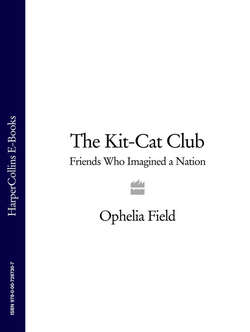The Kit-Cat Club: Friends Who Imagined a Nation

Реклама. ООО «ЛитРес», ИНН: 7719571260.
Оглавление
Ophelia Field. The Kit-Cat Club: Friends Who Imagined a Nation
Table of Contents
PREFACE
PROLOGUE DRYDEN'S FUNERAL, MAY 1700
I SELF-MADE MEN
II FRIENDSHIPS FORMED
III THE SCENT OF THE PIE-OVEN
IV THE TOAST OF THE TOWN: A KIT-CAT MEETING, 1697
V CULTURE WARS
VI THE EUROPEANS
VII THE WHIGS GO TO WAR
VIII KIT-CAT CONNOISSEURS
IX BY SEVERAL HANDS
X THE COMEBACK KITS
XI UNEASY UNIONS: 1707
XII BESET
XIII IRELAND: KIT-CAT COLONY
XIV THE MONOPOLY BROKEN: WHIG DOWNFALL
XV IN THEIR OWN IMAGE
XVI THE CRISIS
XVII BIG WHIGS: THE FIRST GEORGIANS
XVIII PARADISE LOST
XIX THE END OF THE CLUB
XX LATER CLUBS AND KIT-CATS
EPILOGUE LEGACIES
NOTES. PROLOGUE
I SELF-MADE MEN
II FRIENDSHIPS FORMED
III THE SCENT OF THE PIE-OVEN
IV THE TOAST OF THE TOWN: A KIT-CAT MEETING, 1697
V CULTURE WARS
VI THE EUROPEANS
VII THE WHIGS GO TO WAR
VIII KIT-CAT CONNOISSEURS
IX BY SEVERAL HANDS
X THE COMEBACK KITS
XI UNEASY UNIONS: 1707
XII BESET
XIII IRELAND: KIT-CAT COLONY
XIV THE MONOPOLY BROKEN: WHIG DOWNFALL
XV IN THEIR OWN IMAGE
XVI THE CRISIS
XVII BIG WHIGS: THE FIRST GEORGIANS
XVIII PARADISE LOST
XIX THE END OF THE CLUB
XX LATER CLUBS AND KIT-CATS
EPILOGUE: LEGACIES
BIBLIOGRAPHY
LIST OF MEMBERS
INDEX
Acknowledgements
About the Author
Copyright
About the Publisher
Отрывок из книги
OPHELIA FIELD
The Kit-Cat Club
.....
When Addison sent a poem flattering Dryden's talent to the poet in London, Dryden and Tonson included it in the Miscellany Poems they co-edited in 1693.36 Addison's 1694 poem, ‘An Account of the Greatest English Poets’, then summarized the history of English poetry, culminating—implausibly to modern judgement—with Charles Montagu at its pinnacle. Addison immediately found a flattered benefactor in the 33-year-old Chancellor of the Exchequer. Steele later recalled that Congreve was the instrument of Addison's ‘becoming acquainted with’ Montagu.37 How Congreve and Addison first met, however, is uncertain. Most likely it was through Dryden and/or Tonson, following Addison's inclusion in the Miscellany, or perhaps Tonson invited Addison home to the Fleet Street house the publisher then shared with Congreve. Either way, there was soon mutual respect between Addison and Congreve, whose respective specializations in Latin and Greek literature spared them direct rivalry.
By 1695, Addison was studying to take orders, though he increasingly wished neither to follow his father into the Church nor to remain a university tutor. Addison therefore sought to add a further patron to his portfolio and did so in the traditional way: by poetic tribute. His verse ‘On His Majesty, Presented to the Lord Keeper [Somers]’ was a bold move on the young academic's part, since he had never met Somers, and had no family connection to justify the presentation. Somers must not have minded, since he let Tonson and Congreve bring the poem's author to meet him. Until now, Addison had been not so much a Whig as Whig-leaning, but these two poems, courting Montagu and Somers, marked his first clear declaration of political allegiance.
.....